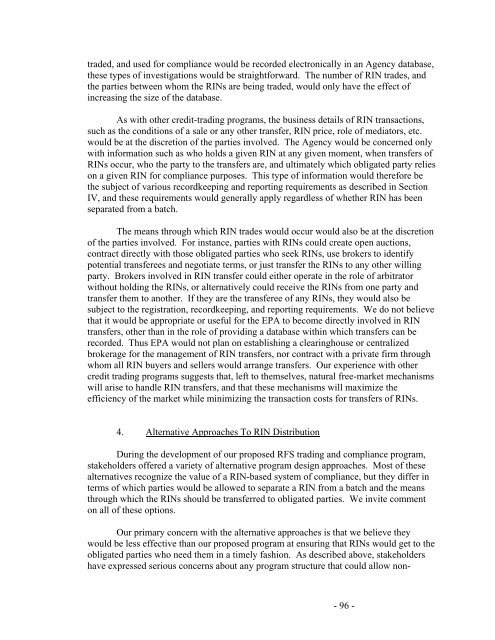Regulation of Fuels and Fuel Additives: Renewable Fuel Standard ...
Regulation of Fuels and Fuel Additives: Renewable Fuel Standard ...
Regulation of Fuels and Fuel Additives: Renewable Fuel Standard ...
Create successful ePaper yourself
Turn your PDF publications into a flip-book with our unique Google optimized e-Paper software.
traded, <strong>and</strong> used for compliance would be recorded electronically in an Agency database,<br />
these types <strong>of</strong> investigations would be straightforward. The number <strong>of</strong> RIN trades, <strong>and</strong><br />
the parties between whom the RINs are being traded, would only have the effect <strong>of</strong><br />
increasing the size <strong>of</strong> the database.<br />
As with other credit-trading programs, the business details <strong>of</strong> RIN transactions,<br />
such as the conditions <strong>of</strong> a sale or any other transfer, RIN price, role <strong>of</strong> mediators, etc.<br />
would be at the discretion <strong>of</strong> the parties involved. The Agency would be concerned only<br />
with information such as who holds a given RIN at any given moment, when transfers <strong>of</strong><br />
RINs occur, who the party to the transfers are, <strong>and</strong> ultimately which obligated party relies<br />
on a given RIN for compliance purposes. This type <strong>of</strong> information would therefore be<br />
the subject <strong>of</strong> various recordkeeping <strong>and</strong> reporting requirements as described in Section<br />
IV, <strong>and</strong> these requirements would generally apply regardless <strong>of</strong> whether RIN has been<br />
separated from a batch.<br />
The means through which RIN trades would occur would also be at the discretion<br />
<strong>of</strong> the parties involved. For instance, parties with RINs could create open auctions,<br />
contract directly with those obligated parties who seek RINs, use brokers to identify<br />
potential transferees <strong>and</strong> negotiate terms, or just transfer the RINs to any other willing<br />
party. Brokers involved in RIN transfer could either operate in the role <strong>of</strong> arbitrator<br />
without holding the RINs, or alternatively could receive the RINs from one party <strong>and</strong><br />
transfer them to another. If they are the transferee <strong>of</strong> any RINs, they would also be<br />
subject to the registration, recordkeeping, <strong>and</strong> reporting requirements. We do not believe<br />
that it would be appropriate or useful for the EPA to become directly involved in RIN<br />
transfers, other than in the role <strong>of</strong> providing a database within which transfers can be<br />
recorded. Thus EPA would not plan on establishing a clearinghouse or centralized<br />
brokerage for the management <strong>of</strong> RIN transfers, nor contract with a private firm through<br />
whom all RIN buyers <strong>and</strong> sellers would arrange transfers. Our experience with other<br />
credit trading programs suggests that, left to themselves, natural free-market mechanisms<br />
will arise to h<strong>and</strong>le RIN transfers, <strong>and</strong> that these mechanisms will maximize the<br />
efficiency <strong>of</strong> the market while minimizing the transaction costs for transfers <strong>of</strong> RINs.<br />
4. Alternative Approaches To RIN Distribution<br />
During the development <strong>of</strong> our proposed RFS trading <strong>and</strong> compliance program,<br />
stakeholders <strong>of</strong>fered a variety <strong>of</strong> alternative program design approaches. Most <strong>of</strong> these<br />
alternatives recognize the value <strong>of</strong> a RIN-based system <strong>of</strong> compliance, but they differ in<br />
terms <strong>of</strong> which parties would be allowed to separate a RIN from a batch <strong>and</strong> the means<br />
through which the RINs should be transferred to obligated parties. We invite comment<br />
on all <strong>of</strong> these options.<br />
Our primary concern with the alternative approaches is that we believe they<br />
would be less effective than our proposed program at ensuring that RINs would get to the<br />
obligated parties who need them in a timely fashion. As described above, stakeholders<br />
have expressed serious concerns about any program structure that could allow non-<br />
- 96 -
















